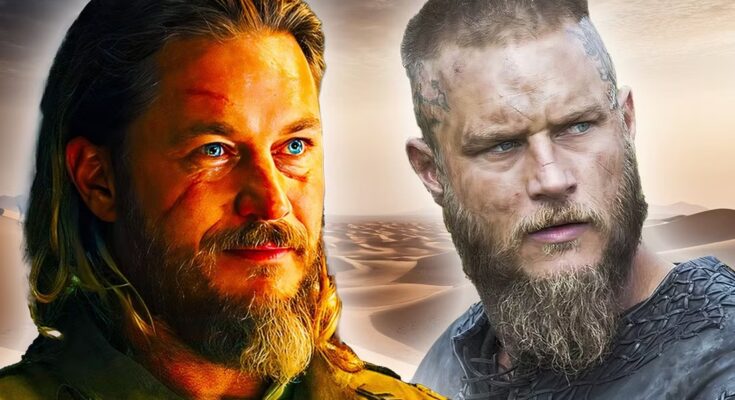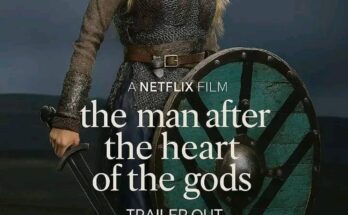Travis Fimmel’s New TV Show With 72% On Rotten Tomatoes Finally Gives Him A Replacement For Ragnar, 4 Years After Vikings Ended
Travis Fimmel’s role in Dune: Prophecy is quite similar to his character Ragnar Lothbrok in Vikings, since they are both accomplished warriors. It is great to see Fimmel in a role like this again, since he embodied Ragnar so well for four seasons of Vikings. Fimmel led the cast of Vikings as Ragnar Lothbrok for the first four seasons of the show, before his shocking death. In Vikings, Fimmel played a farmer who rose up to become a Scandinavian king.
Throughout his time on Vikings, Fimmel received a lot of acclaim for his role of Ragnar. Vikings has an impressive score of 93% on Rotten Tomatoes, and the four seasons that feature Ragnar as the main character are generally viewed as the best seasons of Vikings. Therefore, fans were disappointed when Ragnar Lothbrok was killed off in season 4. However, fans who have missed Ragnar can now rejoice, since his character in Dune: Prophecy is quite similar. However, there are also some key differences between the characters that make each of them unique.
Travis Fimmel has always been a fascinating figure in television, known for his rugged charisma, layered performances, and ability to embody characters that feel larger than life yet deeply human. For years, his portrayal of Ragnar Lothbrok in the hit series Vikings cemented him as one of the most captivating stars on television. Ragnar wasn’t just another protagonist; he was a mythic figure brought down to earth through Fimmel’s raw performance, blending cunning intellect with vulnerability, brutality with tenderness. When Vikings ended, fans wondered what could possibly come next for Fimmel—how could he replace a character so iconic and a role that became almost synonymous with his career? Four years later, audiences might finally have their answer.
Fimmel’s new television project has been released, and according to Rotten Tomatoes, it currently holds a 72% rating. While not a flawless triumph, this score reflects a strong and respectable reception, especially for a show arriving in the long shadow of Vikings. More importantly, it signals that Fimmel has found a vehicle capable of reintroducing him to audiences who were captivated by Ragnar while giving him the space to explore new facets of his craft. This isn’t Ragnar 2.0—it’s something different, something uniquely suited to a performer who thrives when handed characters with grit, depth, and moral complexity.
The expectations surrounding Fimmel’s career after Vikings were immense. Few television actors become so synonymous with their characters that audiences struggle to separate the performer from the role, and Fimmel was one of them. Ragnar’s journey—from farmer to king, visionary to tragic figure—was such a compelling narrative arc that many believed it would be impossible for Fimmel to top or even equal it. While he has appeared in other projects, including Ridley Scott’s Raised by Wolves, nothing quite carried the same weight or cultural impact as Vikings.
That is why this new series, bolstered by its solid critical reception, feels like a breakthrough. It suggests that Fimmel has finally found the right narrative landscape to inhabit, one that allows him to draw on the magnetism that defined Ragnar while avoiding the trap of simple repetition. Fans who tune in are not looking for him to reprise Vikings—they are searching for that same sense of gravitas and unpredictability he brought to the screen years ago. Judging by the show’s response, it appears he delivers.
The 72% Rotten Tomatoes score is telling. While it may not be the near-universal acclaim of some prestige television series, it reflects a project that has connected with audiences and critics alike, offering substance, entertainment, and a strong central performance. For Fimmel, this is significant because it places him back in the cultural conversation. Not every actor can transition from a role so defining, but those who do often do so by embracing fresh challenges rather than chasing past glories. Fimmel seems to understand this balance, and his new show benefits from it.
One of the elements that makes Fimmel’s work so enduring is his ability to inhabit characters who live in moral grey zones. Whether it’s Ragnar’s ambition and ruthlessness tempered by curiosity and vision, or his latest role that showcases resilience and survival instincts, Fimmel excels at portraying men who are neither saints nor villains but complex figures caught in the storms of their time. This kind of complexity resonates with modern audiences, who often prefer layered protagonists to the simple dichotomies of traditional storytelling.
For longtime Vikings fans, the parallels between Ragnar and Fimmel’s new character are worth noting, even if the narratives are distinct. Both roles demand a kind of primal intensity, a sense of a man deeply in touch with both brutality and vulnerability. Both also thrive in settings that allow Fimmel to use his physicality as part of his performance—whether it’s through combat, survival, or commanding presence in a hostile environment. The new series doesn’t ask Fimmel to abandon the qualities that made Ragnar unforgettable; rather, it harnesses them in a new context, giving fans echoes of the past while inviting them into a fresh story.
It is also worth acknowledging that the entertainment landscape has shifted in the four years since Vikings ended. Audiences today consume content differently, often binge-watching and streaming, with an ever-growing array of choices. For Fimmel to break through once again requires more than just nostalgia for his earlier work—it requires a show that can compete on its own terms. The Rotten Tomatoes score suggests that while the series may not be a runaway critical darling, it is strong enough to stand out in a crowded field and offer something audiences value.
Part of the fascination with Fimmel’s post-Vikings career has always been how he approaches fame. Known for his reluctance to fully embrace the spotlight and his often understated approach to his career, Fimmel has never seemed particularly interested in chasing stardom for its own sake. Instead, he gravitates toward roles that intrigue him, stories that allow him to explore humanity’s rawer edges. This approach, while sometimes frustrating for fans eager to see him headline every blockbuster, has given his career a certain integrity. His latest project continues that trend—it is not a pandering attempt to recreate Ragnar’s magic but a serious attempt to tell a new story.
The positive reception of the show could also represent an important turning point for Fimmel’s broader career trajectory. While Ragnar will always be a defining role, actors who last build a portfolio of memorable performances across genres and eras. If this show continues to find an audience, it could position Fimmel for a second act that is every bit as compelling as his first. From there, he could transition into even more ambitious projects, whether in film or television, expanding his reach while maintaining the core qualities that make him so watchable.
For fans, the new series offers a dual pleasure. On one hand, it provides a sense of closure and continuation, as though Fimmel has finally found a role that allows him to move forward without erasing Ragnar’s legacy. On the other, it delivers the excitement of discovery—the joy of watching a talented actor reinvent himself and bring something new to the screen. The fact that it has been embraced with a 72% Rotten Tomatoes score underscores that this isn’t just a vanity project or a stumble; it’s a meaningful addition to Fimmel’s body of work.
Ultimately, the story here is not just about numbers or reviews but about resilience, evolution, and the enduring appeal of one of television’s most fascinating stars. Travis Fimmel will always be remembered as Ragnar, but he has shown that his talent is not confined to one role or one era. His new series, with its solid critical reception and growing audience, proves that he has found a worthy successor to his most iconic character. Four years after Vikings ended, fans finally have the chance to see Fimmel not just as the ghost of Ragnar past but as an actor still very much in his prime, capable of surprising, challenging, and captivating viewers all over again.



